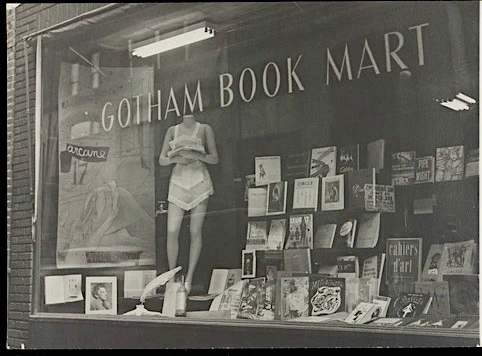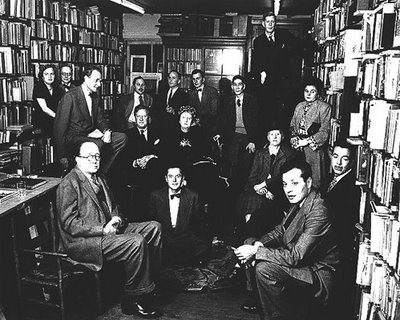 Many of America’s best independent bookstores have been under siege. Pressure from big-box discounters and the internet is a continuing struggle in the exchange of books, ideas and commerce. In May of 2007, the venerable Gotham Book Mart of New York City, home of the Finnegan’s Wake Society, closed its doors for the last time.
Many of America’s best independent bookstores have been under siege. Pressure from big-box discounters and the internet is a continuing struggle in the exchange of books, ideas and commerce. In May of 2007, the venerable Gotham Book Mart of New York City, home of the Finnegan’s Wake Society, closed its doors for the last time.
Located on west 47th street in the heart of the diamond district, Gotham attracted many celebrated writers and artists (i.e., Arthur Miller, J.D. Salinger, W.H. Auden, John Updike, Man Ray). Artist Edward Gorey who had many titles published by Gotham, often slept in a small upstairs room when he came into the city making it his second home. One could always find a shelf or two of signed Gorey books. A hidden backroom walk-in closet was home to hundreds of rarities and signed limited editions. Owner Andreas Brown, a cranky bibliophile stood guard nearby buried behind an old wooden desk stacked with books and roaming cats. If Mr. Brown was in a good mood, he’d show off some treasures locked away in the “no one allowed” room.
“Founded in 1920, it was one of the finest repositories of original and rare literature in the city, and, during the long tenure of former proprietor Frances Steloff, a major haunt for many notable American and foreign writers of the 20th century, and also a cultural pacesetter; the store sold censored and controversial works, even fielding a lawsuit by a ninny who was offended by its sale of Nobel Laureate André Gide‘s If It Die. (Those were the days–now the ninnies don’t even deign to pick up works of imaginative literature any more and get worked up.) Allen Ginsberg and Amiri Baraka in their youth worked there as clerks, but poor Tennessee Williams didn’t “last a day. (for one thing, he didn’t know how to wrap packages.”
“The bookstore attracted celebrities from the entertainment world as well. From Charlie Chaplin, George Gershwin, and Gloria Swanson to Woody Allen, Patti Smith, and David Bowie, familiar figures would often be seen browsing seemingly chaotic and disorderly shelves or loose stacks of books lining the few aisles.” — Source: One Poet’s Notes
The continual closings of cultural institutions like Gotham Book Mart (read: The Internet is Killing Independent Bookstores), or Cody’s Books in San Francisco, and many others, is making it clear that a world of mindful diversity, literary culture and independent thinking is fast decaying under the continuing dire spell of commercial branding and mass merchandising. Read a recent article about the closing of Dutton’s books in Los Angeles, from The Nation: Eulogy for an Independent Bookstore.
Area independent bookshops like Shaman’s Drum, Nicola’s and Crazy Wisdom in Ann Arbor or Book Beat and John Kings in Detroit are not immune to this crisis. These are each unique and meaningful, near spiritual places that have helped to define our community through good and bad times. Please Remember: Think Independent, Read Independent, and Buy Independent. We thank you.
“Where is the wisdom
We have lost in Knowledge?
Where is the knowledge
We have lost in information?” — T.S. Eliot
*Independent bookstore is a term used in to identify bookstores that are primarily locally owned and operated. They tend to have strong ties to the community and are frequently involved in non-profit community events as well as in cultivating the work of young writers. Independent bookstore selection tends to be more esoteric and less mainstream than chain bookstores. — Wikipedia

The above photograph was taken November 9, 1948, during a reception at the Gotham Book Mart for Dame Edith & Sir Osbert Sitwell (seated in the center). Clockwise, they are surrounded by W.H. Auden (seated on the ladder), Elizabeth Bishop, Marianne Moore, Delmore Schwartz, Randall Jarrell, Charles Henri Ford, William Rose Benet, Stephen Spender, Marya Zaturenska, Horace Gregory, Tennessee Williams, Richard Eberhart, Gore Vidal, and José Garcia Villa. The Gotham Book Mart is now gone, but its important position in twentieth-century literary history will persist long into the future—alongside a few other book shops, like Shakespeare & Co. in Paris or the City Lights Bookstore in San Francisco—permanently associated with many of the period’s finest writers, including those individuals captured in that black-and-white snapshot nearly six decades ago.
